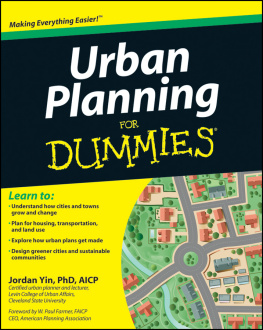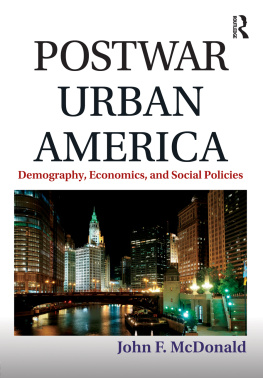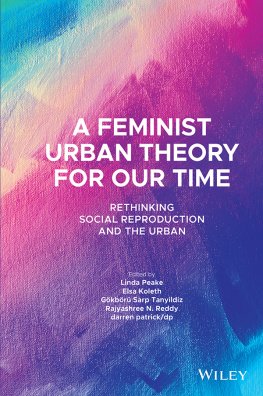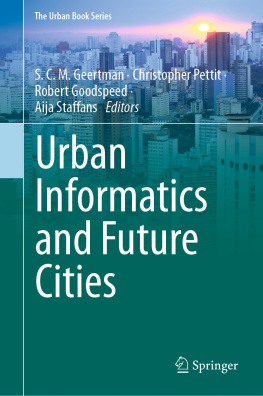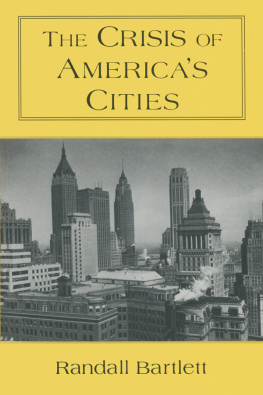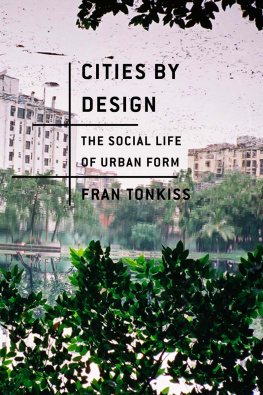Originally published in 1973 by Lieber-Atherton, Inc.
Published 2012 by Transaction Publishers
Published 2017 by Routledge
2 Park Square, Milton Park, Abingdon, Oxon OX14 4RN
711 Third Avenue, New York, NY 10017, USA
Routledge is an imprint of the Taylor & Francis Group, an informa business
Copyright 1972 by Lieber-Atherton, Inc.
All rights reserved. No part of this book may be reprinted or reproduced or utilised in any form or by any electronic, mechanical, or other means, now known or hereafter invented, including photocopying and recording, or in any information storage or retrieval system, without permission in writing from the publishers.
Notice:
Product or corporate names may be trademarks or registered trademarks, and are used only for identification and explanation without intent to infringe.
Library of Congress Catalog Number: 2011028474
Library of Congress Cataloging-in-Publication Data
Urban theory / Ely Chinoy, editor.
p. cm.
Originally published in 1973 by Leiber-Atherton as: The urban future.
ISBN 978-1-4128-4277-8
1. Cities and towns--United States. I. Chinoy, Ely. II. Chinoy, Ely. Urban future.
HT123.C48 2011
307.760973--dc23
2011028474
ISBN 13: 978-1-4128-4277-8 (pbk)
ELY CHINOY
As our attention has been increasingly and belatedly directed toward the problems of our cities, it has become more and more apparent that the city can no longer be thought of or dealt with by itself, and apart from the rest of American society. The problems that constitute the contemporary urban crisisslums and housing, physical deterioration, crime, underfinanced local governments and overtaxed property owners, inadequate public services, deficient educational facilities and programs, racial conflict, poverty and overburdened welfare rolls, congested traffic and inadequate mass transportation, pollution of air and waterare not confined to the cities, even though their most acute manifestations are often found there.
Sociologists have conventionally distinguished sharply between the urban and the nonurban, between the city and the small town or rural countryside. They emphasized the size, density, and heterogeneity of the city and its distinctive values, life styles, forms of social organization, patterns of social interaction, and economic activities. But as cities have grown and urban populations have spread, these distinctions between the urban and the nonurban have become blurred. Increasingly elaborate networks of transportation and communication have diffused urban culture so widely that traditional contrasts have been substantially diminished. City, suburb, town, and countryside have been progressively integrated into larger and more encompassing social, economic, and political structures.
Like the sociologists, political scientists, and economists, urban planners are finding their conventional perspectives increasingly inadequate as guides to the contemporary urban scene. Students of urban government and politics are largely agreed that present legal boundaries rarely define areas that make political or administrative sense, though there is no consensus as to the merits of either greater neighborhood control of some local functions, or of various forms of metropolitan or regional government. Economists, who may see the city as a locational matrix for economic activity or as an economic unit to be analyzed in terms of inputs and outputs, find that noneconomic factors and external economic circumstances affect, or even determine, the citys economic life. The economic problems located within the city frequently turn out to require action on a larger stagethe region, the state, the nation. Urban planners, too, often discover that their efforts to solve the citys problems cannot be confined within its boundaries and are therefore led to larger considerations and wider perspectives.
If traditional definitions of the citysociological, economic, politicalare no longer adequate, what alternative perspectives can be brought to bear? In view of the changes that have taken place, or are taking place, what are the relevant contexts for the analysis of urban problems? Should attention be focused upon the metropolitan area, the region, or, where it exists, the megalopolis? Would it be enough merely to distinguish between city and suburb, the metropolitan center and the ring that surrounds it, and to explore the relations between them? Or does the changing shape and structure of urban America require totally new ways of thinking about the urban community?
There are, of course, no ready answers to these questions. The conventional sociological analysis may continue to have validity for part of the urban world, even as new and different urban forms appear. With increasing scale and complexity, the focus of attention may have to be the relationships among the various forms of urban developmentneighborhood, central city, suburb, satellite city, metropolitan region, megalopolis. As John Friedmann and John Miller assert, perhaps the city can no longer be seen as a physical entity, but must be viewed as a pattern of point locations and connecting flows of people, information, money, and commodities.1 Moreover, the urban future is so uncertain and problematic that what seems to make theoretical sense today may be wrong or inadequate tomorrow. As David Riesman once remarked: Events continually outdistance our attempts to understand them; social scientists, no less than other people, must structure the world while at the same time keeping up with it.2
Rather than try to freeze some knife-edge moment, in C. Wright Millss graphic phrase, it may be more fruitful to examine the direction in which urban society is moving. Whatever urban America is like today, it is sure to be somewhat different tomorrow. Perhaps by examining what the future may hold in store we can more readily understand the present, cope with its problems, and deliberately and consciously contribute to the shape of the future.
Prediction is an uncertain enterprise deemed appropriate for soothsayers, prophets, and visionaries, but usually avoided by social scientists. Often oriented more to the past than to the future, concerned with facts rather than speculation, sensitive to the complexity of social structure and historical processes, and keenly aware of the still rudimentary level of many of their theories, social scientists characteristically limit themselves to short-run, carefully hedged predictionsif they venture even that far. Few sociologists have tried to see what urban America may become, though their failure to do so inevitably limits their ability to serve the function they claim for themselvesenabling men to help shape their own future.* Unless men can to some degree anticipate the alternatives open to them they will necessarily remain captive to forces which they do not understand and over which they have no control.
To explore the futureor possible futuresdoes not require, as some might fear, a commitment to a rigid determinism or a venture into uncertain prophecy. It entails instead consideration of present trends and of the social and cultural variables that may affect them, analysis of urban problems and possible solutions, and a careful review of the proposals of planners, politicians, and even visionaries for remaking our cities and for controlling or directing anticipated growth.


